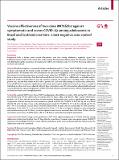Vaccine effectiveness of two-dose BNT162b2 against symptomatic and severe COVID-19 among adolescents in Brazil and Scotland over time : a test-negative case-control study
Abstract
Background Little is known about vaccine effectiveness over time among adolescents, especially against the SARS-CoV-2 omicron (B.1.1.529) variant. This study assessed the associations between time since two-dose vaccination with BNT162b2 and the occurrence of symptomatic SARS-CoV-2 infection and severe COVID-19 among adolescents in Brazil and Scotland. Methods We did test-negative, case-control studies in adolescents aged 12–17 years with COVID-19-related symptoms in Brazil and Scotland. We linked records of SARS-CoV-2 RT-PCR and antigen tests to national vaccination and clinical records. We excluded tests from individuals who did not have symptoms, were vaccinated before the start of the national vaccination programme, received vaccines other than BNT162b2 or a SARS-CoV-2 booster dose of any kind, or had an interval between their first and second dose of fewer than 21 days. Additionally, we excluded negative SARS-CoV-2 tests recorded within 14 days of a previous negative test, negative tests recorded within 7 days after a positive test, any test done within 90 days after a positive test, and tests with missing sex and location information. Cases (SARS-CoV-2 test-positive adolescents) and controls (test-negative adolescents) were drawn from a sample of individuals in whom tests were collected within 10 days of symptom onset. We estimated the adjusted odds ratio and vaccine effectiveness against symptomatic COVID-19 for both countries and against severe COVID-19 (hospitalisation or death) for Brazil across fortnightly periods. Findings We analysed 503 776 tests from 2 948 538 adolescents in Brazil between Sept 2, 2021, and April 19, 2022, and 127 168 tests from 404 673 adolescents in Scotland between Aug 6, 2021, and April 19, 2022. Vaccine effectiveness peaked at 14–27 days after the second dose in both countries during both waves, and was significantly lower against symptomatic infection during the omicron-dominant period in Brazil (64·7% [95% CI 63·0–66·3]) and in Scotland (82·6% [80·6–84·5]), than it was in the delta-dominant period (80·7% [95% CI 77·8–83·3] in Brazil and 92·8% [85·7–96·4] in Scotland). Vaccine efficacy started to decline from 27 days after the second dose for both countries, reducing to 5·9% (95% CI 2·2–9·4) in Brazil and 50·6% (42·7–57·4) in Scotland at 98 days or more during the omicron-dominant period. In Brazil, protection against severe disease remained above 80% from 28 days after the second dose and was 82·7% (95% CI 68·8–90·4) at 98 days or more after receiving the second dose. Interpretation We found waning vaccine protection of BNT162b2 against symptomatic COVID-19 infection among adolescents in Brazil and Scotland from 27 days after the second dose. However, protection against severe COVID-19 outcomes remained high at 98 days or more after the second dose in the omicron-dominant period. Booster doses for adolescents need to be considered.
Citation
Florentino , P T V , Millington , T , Cerqueira-Silva , T , Robertson , C , de Araújo Oliveira , V , Júnior , J B S , Alves , F J O , Penna , G O , Vital Katikireddi , S , Boaventura , V S , Werneck , G L , Pearce , N , McCowan , C , Sullivan , C , Agrawal , U , Grange , Z , Ritchie , L D , Simpson , C R , Sheikh , A , Barreto , M L , Rudan , I , Barral-Netto , M & Paixão , E S 2022 , ' Vaccine effectiveness of two-dose BNT162b2 against symptomatic and severe COVID-19 among adolescents in Brazil and Scotland over time : a test-negative case-control study ' , The Lancet Infectious Diseases , vol. 22 , no. 11 , pp. 1577-1586 . https://doi.org/10.1016/S1473-3099(22)00451-0
Publication
The Lancet Infectious Diseases
Status
Peer reviewed
ISSN
1473-3099Type
Journal article
Description
VK is funded by an NHS Research Scotland Senior Clinical Fellowship (SCAF/15/02), the UK Medical Research Council (MC_UU_00022/2), and the Scottish Government Chief Scientist Office (SPHSU17). MB-N and VdAO are funded by the Fazer o Bem Faz Bem programme from JBS SA. MB-N is also funded by CNPQ and FAPESB (PNX0008/2014). EPS is funded by the Wellcome Trust (213589/Z/18/Z). For the purpose of open access, the author has applied a CC BY public copyright licence to any author accepted manuscript version arising from this submission.Collections
Items in the St Andrews Research Repository are protected by copyright, with all rights reserved, unless otherwise indicated.

